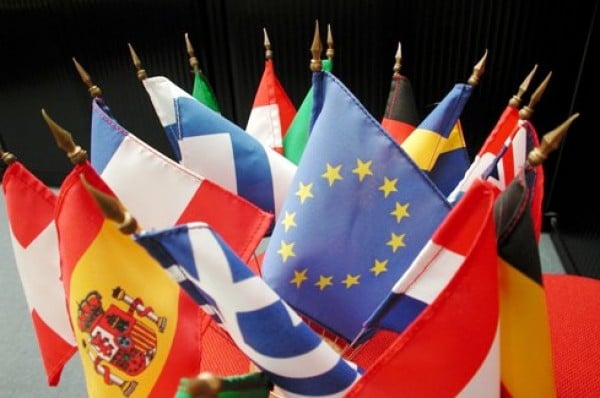
Ever since Poland’s Law and Justice Party (PiS) rose to power in November 2015 on a conservative ticket, the country’s institutions have been mercilessly assaulted. From gagging state media to gridlocking the constitutional court, the PiS government has managed to turn one of the EU’s success stories into a backwater.
That reckless behavior was on full display last week when Donald Tusk was re-elected as President of the European Council in spite of raving opposition from Polish Prime Minister Beata Szydlo who tried to oust her political opponent.
While Poland is still nominally obliged to respect democratic principles regarding the rule of law as a member state, and the European Commission has been “forcefully” expressing its displeasure with the country’s course of action, PiS has so far been unstoppable.
Brussels’ muted response stems mostly from the toothlessness of Europe’s options for sanctioning misbehaving members. Article 7, for example, was added to the Treaty of the European Union in the late 1990s as a way of holding members accountable for rights violations, enabling the Council to issue a formal warning before revoking the voting rights of the violating country. Even after the Commission triggered the pre-Article 7 process last year, Warsaw’s response was little more than a shrug.
By failing to coerce Warsaw into changing its way, the move instead exposed the EU’s practical inability to enforce the rule of law in member states. As is the case with many of Europe’s rules and procedures, the systemic rule of law mechanism presupposes a willingness to cooperate from the affected national governments. Warsaw has considered the dispute closed since submitting a detailed response regarding its views to the European Commission, allowing Poland to stonewall the Commission from taking repercussive measures for almost a year now.
Making matters worse, actually going through with invoking Article 7—the “nuclear option”—is nearly impossible because this would require a unanimous vote from EU member states. Hungary’s Viktor Orban, who is himself busy upending Hungarian democracy, has already expressed his opposition to employing Article 7 against Poland and has no interest in seeing Law and Justice reprimanded for following his lead. Between them, Budapest and Warsaw have exposed the ineffective enforcement of the EC’s mechanisms. Absent the “spirit of cooperation,” national governments can stall Europe’s legislative process to their own ends.
Faced with this dilemma, European Commissioner for Justice Vera Jourová has drawn inspiration from the US Congress and its “power of the purse” by proposing to make the distribution of EU funding dependent on whether states uphold fundamental EU principles like the rule of law.
In the U.S., the federal government uses funding it provides to the states as leverage when the two sides find themselves at odds. Washington has, for example, used federal highway funding to force states into adopting laws on speed limits and drinking age. Seeing how countless projects within the EU member states and the surrounding European neighborhood rely on money from Brussels, the funds Europe provides (and recipients take for granted) could very well be turned into an effective enforcement tool.
Countries like Poland and Hungary, where derogations from EU standards are the most egregious, also happen to be most susceptible to any kind of budget pressure. The Polish government heavily relies on EU funding, to the tune of €104.8 billion between 2014 and 2020. Losing that support would drastically impact the Polish economy and the functioning of the national government, offering a powerful incentive for Poland to comply with the EU’s rule of law principles.
This approach can also be easily applied to aspiring EU members, which enjoy billions of euros in funding under the Instrument for Pre-accession Assistance (IPA), which falls under the European Neighborhood Policy (ENP). In the Western Balkans, the EU is the largest investor committed to improving governance and rule of law—areas that are notoriously lacking. Montenegro, for example, is one of the leading candidates for EU ascension and yet it faces rising concerns over corruption and insufficient judicial independence. Freedom House noted a declining trend in Montenegro’s governance, especially since the 2016 election.
That election’s troubling aftermath saw opposition figures arrested, with parties opposed to the continued rule of long-time leader Milo Dukanovic boycotting parliament in a political crisis that exposed the fragility of Montenegro’s rule of law. These developments make the EU’s €270.5 million in funding, €99.2 million of which are supposed to be used for improving the judiciary and fighting corruption and organized crime, appear like wasted money.
Dukanovic, who has placed an ally in the premiership but is still leader of the ruling party, is notorious for his links to mafia organizations and cigarette smuggling. Of course, that IPA funding can be seen in a very different light: combined with the carrot of eventual EU membership, it gives Brussels an important tool for pushing Montenegro towards real reform.
The stakes are even higher in Serbia. Despite being an EU candidate country, Serbia has begun to fuel tensions between neighboring Balkan states by taking an aggressive nationalist stance on a variety of issues. Relations have notably declined between Serbia and Bosnia over a genocide appeal, leading to significant delays in the reform efforts. Even so, the Serbs depend on €1.5 billion worth of ENP allocations for infrastructure improvements and economic transition. Thus far, the worst they have seen from the EU are verbal reprimands which are clearly not doing the job.
With the rise of the far-right and nationalist sentiments across the continent, it is more important than ever to enforce the fundamental principles of the European Union and make the EU a coherent, consistent voice for democratic values and good governance. The EC’s existing mechanisms to enforce compliance have been exposed as paper tigers, but Europe still needs to be able to bring unruly member and prospective states to heel. By leveraging the billions of Euros it sends to these countries, the Union can make sure its rules and principles are no longer trampled underfoot.